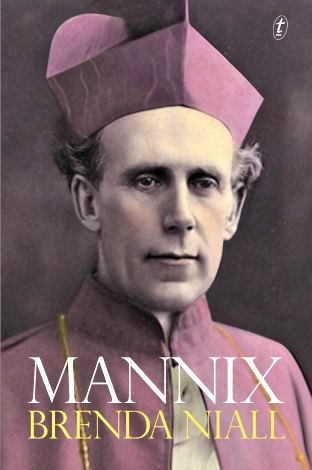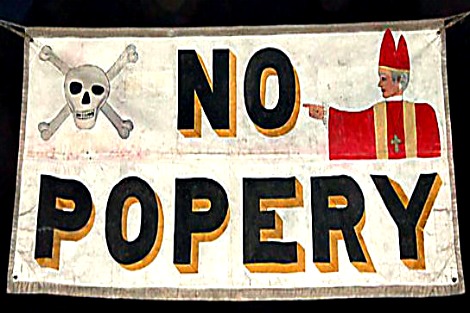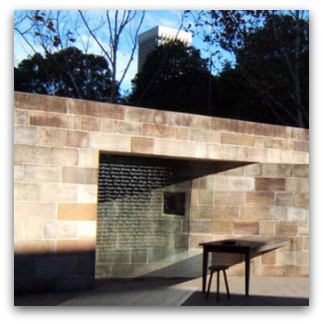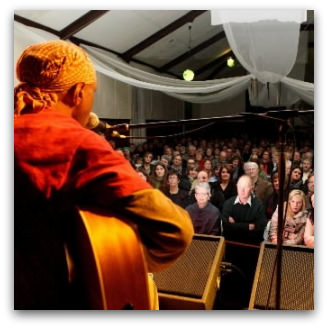Keywords: Archbishop Mannix
-

- Frank Brennan
- 08 July 2015
3 Comments
I suspect Pope Francis had some of our Jesuit alumni in mind when he wrote in his encyclical Laudato Si: 'A politics concerned with immediate results, supported by consumerist sectors of the population, is driven to produce short-term growth... True statecraft is manifest when, in difficult times, we uphold high principles and think of the long-term common good. Political powers do not find it easy to assume this duty'.
READ MORE
-

- Simon Caterson
- 02 April 2015
4 Comments
In contrast to the sectarian suspicion expressed by elements of non-Catholic Australia towards Melbourne’s Archbishop Daniel Mannix, who opposed military conscription during the First World War, his Perth contemporary Archbishop Patrick Clune was lauded during the war as ‘pro-war effort, pro-conscription, pro-empire and pro-crown’. Clune travelled from Perth all the way to the Western Front so as to minister to the Catholic soldiers sent there, and he enjoyed warm relations with Protestants and Jews.
READ MORE
-

AUSTRALIA
- Andrew Hamilton
- 26 March 2015
15 Comments
Daniel Mannix, who was Catholic Archbishop of Melbourne 1917-63, knew how to control an audience and shift the perception of events. He argued fiercely against conscription in the 1917 Referendum, and railed against the exploitation of struggling workers. On finishing his new biography, I imagined a meeting between him and Pope Francis, both masters of public symbols with a disdain for church clericalism and sanctimonious speech.
READ MORE 
-

INTERNATIONAL
- Andrew Hamilton
- 25 September 2014
40 Comments
The justified insistence that Muslims should not constantly be called to account for the vicious behaviour of Islamic State is a reminder of the attitude towards Catholics in an earlier generation. They combined suspicion of anything Irish in the aftermath of the 1915 Uprising and more traditional judgments of Catholics on the basis of their beliefs and practices.
READ MORE 
-

RELIGION
- Frank Brennan
- 17 March 2012
Text is from Fr Frank Brennan SJ's St Patrick's Day Celebration talk at the Australian Centre for Christianity and Culture, 17 March 2012.
READ MORE
-

RELIGION
- Frank Brennan
- 30 August 2011
3 Comments
The faith of the Irish in politics, economics and religion is at a low ebb, and for the most understandable of reasons. It is not a famine, but it is mighty grim. There are tens of thousands coming here under the 457 visa and the Irish Working Holiday Visa.
READ MORE
-

INFORMATION
- Gerard Henderson
- 17 August 2010
8 Comments
How times change. Early in the 20th Century, it was Protestant
Orangemen who warned Australians not to vote for a Catholic. In the
early 21 Century, such warnings are now delivered by a former Catholic
priest in a publication of the Jesuit Order. –Gerard Henderson, The Sydney Institute
READ MORE
-

ARTS AND CULTURE
- Juliette Peers
- 06 August 2010
6 Comments
The Power Without Glory
trial ought to be read as a high-profile
and long lasting punishment meted out to traitors to a so-called
Australian normality. Frank Hardy's acquittal
and the campaign to defend his novel partly belong to mid 20th century
Australia's strong anti-Catholic undertow.
READ MORE 
-

INFORMATION
- Gerard Henderson
- 11 March 2010
2 Comments
Towards the end of his life, the French philosopher Jacques Maritan thought it was a you-beaut idea to advocate Catholic/communist dialogue between the Vatican and Stalin's heirs in Moscow. Santamaria made mistakes, yet on the issue of Soviet totalitarianism he was smarter than Maritan.
READ MORE
-

ARTS AND CULTURE
- Val Noone
- 04 September 2009
7 Comments
At the height of Willam Hackett's republican involvements, the Jesuit provincial
offered him a choice of silence or appointment
to Australia. Through a combination of personal memoir and public history, Brenda Niall unravels the riddles of Hackett's life.
READ MORE 
-

AUSTRALIA
- Shane Howard with Regina Lane
- 02 July 2009
15 Comments
Five generations ago, rural Irish migrants built and paid for St Brigid's church at Crossley in south-west Victoria. Today, the people of Crossley and Killarney are fighting to save the gathering place from private ownership.
READ MORE 
-

ARTS AND CULTURE
- Frank Brennan
- 20 April 2009
2 Comments
READ MORE